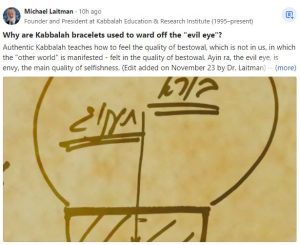
Authentic Kabbalah teaches how to feel the quality of bestowal, which is not in us, in which the “other world” is manifested – felt in the quality of bestowal.
Ayin ra, the evil eye, is envy, the main quality of selfishness.
(Edit added on November 23 by Dr. Laitman)
—
A popular delusion about Kabbalah nowadays is that it can ward off evil eye with bracelets. The wisdom of Kabbalah does have an explanation for how to deal with the evil eye, which of course requires no bracelets, but it first calls for an understanding of what the evil eye is.
So, what is the evil eye according to Kabbalah?
To understand the Kabbalistic definition of evil eye, we need to understand how Kabbalah defines human nature—as an egoistic desire to enjoy at the expense of other people and nature. As is written in the Talmud, the Creator said, “I have created the evil inclination [egoism], and I have created for it the Torah as a spice” (Kiddushin 30b).
Evil is what has been created, which is the ego, a desire that prioritizes self-benefit over benefiting others. If we live by the principle where the better off we are individually, and the better we feel compared to other people, and even more so, the worse they feel then the better we feel, then it is considered as living according to the dictates of the egoistic “evil inclination.” Our entire human nature, which bases our every desire, thought and action, is therefore evil. This is the reason for the world spiraling into increasing crises the more we develop, no matter how good we consider our intentions and actions.
Kabbalah thus defines “evil eye” as our egoistic intentions toward each other, where we view or think about others in terms of what we can reap from them, and not in terms of how we can benefit them.
The wisdom of Kabbalah is a method for transforming our inborn egoistic intention into its opposite altruistic form, or in other words, from desiring to benefit ourselves alone, to wanting to benefit others and nature. Performing such a transformation of our egoistic nature into its opposite giving form is called a “correction” (Heb. Tikkun).
We are currently in a very significant transitional era. On one hand, we experience myriad negative effects from the evil eye, i.e., from our egoistic human nature seeking to exploit others and nature as much as possible for self-benefit. On the other hand, the suffering we accumulate by trying to fulfill ourselves individually at the expense of others is gradually leading us to a state of helplessness and desperation. When we reach such a state, we will become riper to undergo the fateful transformation of our egoistic nature into its altruistic opposite.
The wisdom of Kabbalah is a method that can help accelerate this transition, so that we experience it more smoothly, with more understanding, awareness, and ultimately, joyously.
Featured in Quora